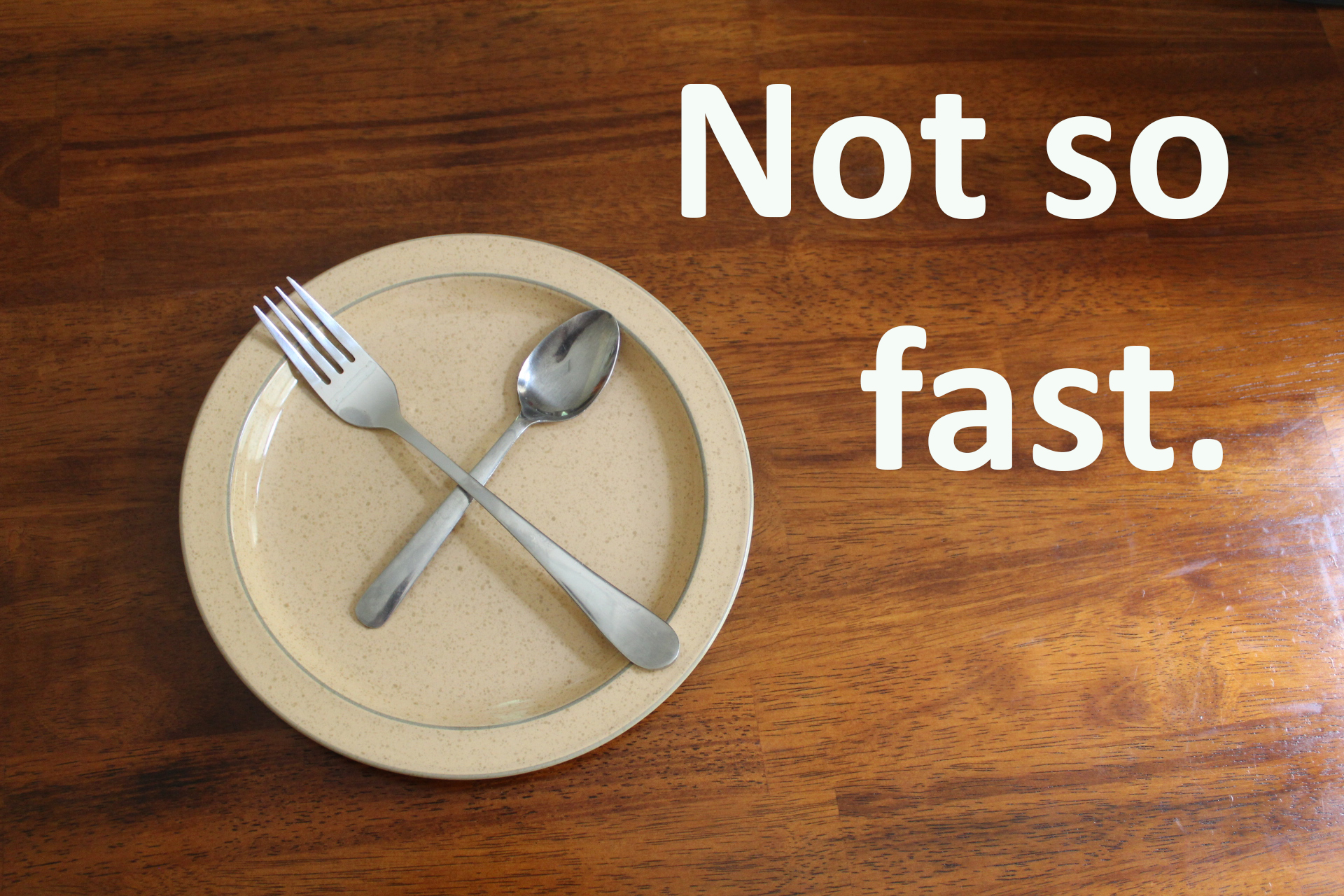When you fast, do not look somber as the hypocrites do, for they disfigure their faces to show others they are fasting. Truly I tell you, they have received their reward in full. But when you fast, put oil on your head and wash your face, so that it will not be obvious to others that you are fasting, but only to your Father, who is unseen; and your Father, who sees what is done in secret, will reward you.
Matthew 6:16-18
In the Sermon on the Mount, Jesus tells us that when we pray we’re not to make public speeches for the benefit of others, we are to talk directly with God. He goes on to matter-of-factly speak of fasting. He doesn’t say, “if you fast…” instead, He says, “when you fast…” Apparently, fasting is expected of Jesus’ followers. Jesus told them to put oil on their heads as they fasted, because in Jesus’ culture putting oil on the head was a normal routine of good grooming. His point was that our fasting should be humble and private, not making a show of it. For this very reason, I don’t recommend putting oil on your head in our culture. That would be a sure sign that something unusual is going on in your life.
The goal of fasting is to spend very intimate private time with the Lord; other people are not invited. Fasting is meant to strengthen our dependence on our heavenly Father and to share in very personal fellowship with Him. There are times when groups of believers are called upon to fast corporately. This can be a powerful tool in promoting united prayer, repentance and intercession. But, fasting is not an opportunity to impress others with our spirituality.
In biblical times, if you fasted from food, you were taking a substantial portion of your day to devote to prayer. In Jesus’ culture, a significant part of the day was devoted to mealtime. When we think of meal preparation today, we picture refrigerators and microwaves. In biblical times, meal preparation often involved killing an animal, grinding wheat into flour, and other complicated procedures we can’t even imagine now. Meal preparation was a time-consuming, eventful part of life. It still is in many developing countries today. But, even if you didn’t have to be involved in the preparation, the meal itself was a time-consuming event. People didn’t gather and “wolf down” the food. Jesus and his disciples are described as reclining at the table. This was the customary way in which everyone ate. The meal was presented in multiple courses.
Mealtime was also considered an important social time. Jesus says in Revelation 3:20: “Here I am! I stand at the door and knock. If anyone hears my voice and opens the door, I will come in and eat with him, and he with me.” The idea was not to grab a burger together. Mealtime was a prolonged celebration of relationship. If I give up a meal today, I’ll probably save about ten or fifteen minutes, not much extra time to devote to prayer. But, there are other time-consuming things in my life from which I can fast.
In Luke 6:12 we read: “One of those days Jesus went out to a mountainside to pray, and spent the night praying to God.” Jesus was fasting from sleep on this occasion. Jesus purposed to spend the night in prayer rather than sleep.
Jesus went outside to pray. I can’t prove this, but I believe one reason He may have decided to pray outdoors was because He would be less likely to fall asleep. Jesus purposefully went outdoors to a remote area and fasted from sleep in order to devote Himself to prayer all night long.
In I Corinthians 7:5 the apostle Paul gives instructions for a special kind of fast: “Do not deprive each other except by mutual consent and for a time, so that you may devote yourselves to prayer. Then come together again so that Satan will not tempt you because of your lack of self-control.”
The apostle Paul recognizes fasting from sexual intimacy in marriage as a way to make extra time to devote to prayer. Paul emphasizes the need for a couple to mutually set a time limit on a sexual fast. This kind of fast is not simply between one person and God. Your spouse is involved and must agree to an intentional fast in order to devote the extra time to prayer. Fasting is about eliminating a time-consuming activity in order to spend the time in prayer. This also speaks to the Bible’s expectations about the time needed in order to develop a healthy sexual relationship in marriage.
There are many other things from which we can fast in order to devote ourselves to prayer. For some of us, giving up golf for a week would create many hours to devote to prayer. It is possible to go onto the golf course to pray, as long as you go without your clubs. Talking with the Lord for the amount of time it takes to walk through eighteen holes would be very beneficial.
Fasting from television has proven to be more than just an opportunity to devote hours of time to prayer; it has also been a way to avoid being conformed to the world for hours at a time. Paul warns us in Romans 12 not to be conformed to the world. A television fast has been one of the most beneficial fasts that Susan and I have found.
Please remember, the context of fasting in Scripture is in order to pray, and the purpose of fasting is to enable us to have more time for focused prayer. Fasting isn’t simply about going without food. In most cultures today, eating still requires a great deal of time in the daily schedule. So, all the things involved in eating are eliminated, and time for prayer is made available.
Susan and I have found Bill Bright’s material on fasting in The Coming Revival to be very helpful. There are helpful recipes for vegetable and fruit juices that make a prolonged fast much more feasible. And, going without food certainly provides ample reminders to pray.
Diabetics may be unable to fast from food. But, having diabetes does not prevent anyone from fasting. We can all fast in some way. As we look for ways to fast from things that are eating up our time, most of us will gain more time with nonfood related fasts. The goal is to set aside time to intentionally devote ourselves to communing with our Lord.
Fasting is not about impressing God with a growling stomach; fasting is about denying yourself something you normally enjoy in order to devote the time to something much more important to you. Your communication with your heavenly Father needs to be the most important thing in your life. So, when are you going to fast?
Featured Resource Book:



